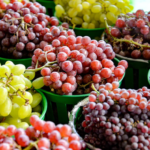South African grape vineyards torched during protests
Protests in South Africa's Western Cape province have led to fires at a reported 15 grape vineyards, damaging an estimated 50 hectares of farmland as of Wednesday afternoon, according to Agri Wes-Cape communications manager Porchia Adams.
The motivation and actors behind the demonstrations in De Doorns were unclear, as reports circulated that the events may have had political roots.
Although some have described the protests as a labor strike, Adams expressed doubt that actual farmers had provoked the scene.
"We’re not sure, first of all, if the initial protesters were farm workers at all. We suspect that they’re not but that they intimidated actual farm workers on the farm to join them, harassing them and threatening them to the point that they join the protest," she told www.freshfruitportal.com.
Leon de Kock of the marketing team at South Africa's Grape Alliance also described an unclear situation where the full impact may not be understood for another two to three weeks.
"There’s no clear indication of what they might want money-wise. It’s more of a political protest where they want to gain control over the Western Cape again," de Kock said.
"We’re dealing with protesters. We’re trying to keep them from burning down our farms."
The Western Cape is a politically contested region, Adams said, which may explain the unrest, although the possible political actors were nclear.
The Western Cape is ruled by the Democratic Alliance and the only province not controlled by the ruling African National Congress.
"We’ve been told that the ruling party wants the Western Cape back. And we suspect that this is one of the messes they’ve used to do that," she said.
"Cosatu (Congress of South African Trade Unions) is a labor organization that is coming to the fore now. They don’t have a strong presence amongst farm workers and they are now perceived as people talking on behalf of farm workers."
Cosatu cannot be linked to the week's events, although they have come forward as a representative of farm workers in negotiations.
Tony Ehrenreich, provincial secretary of Cosatu in Western Cape, said mid-afternoon that negotiations, monitored by the Commission for Conciliation, Mediation and Arbitration, were in progress but that a solution had not yet been found. He attributed the unrest to wage dissatisfaction.
"The farmers and the farm workers' organizations are negotiating to find a solution. The farmers are putting 80 rand (US$9.26) a day, which was rejected by the workers. So the strike continues and we are waiting for the farmers to come back and make a new offer that’s acceptable to the workers," Ehrenreich said.
Adams denied, however, that wage negotiations were on the table.
"They were not wage negotiations as the union put forward. It was a discussion to find a common solution to the problem and to restore order in the valley. So we are committed to oblige to the minimum wage which is prescribed by government and we are not in a position to negotiate wages at all," she said.
Further talks are set for Thursday and another meeting is scheduled for Friday.
Adams expressed hope that a solution would be found soon, given the pending table grape season.
"We’re at the verge of the table grape season and we really need to get back to work but people are scared so we’re hoping we can resolve whatever issues we have on the table because we don’t believe this kind of behavior is necessary," she said.
Adams did not expect severe economic losses, in part due to the relatively small portion that 50 hectares represents out of the region's 3,800 total hectares of grape farmland.
She said that each hectare would cost between ZAR$250,000 (US$28,919) and ZAR$300,000 (US$34,749) to reestablish, not including production costs or loss of wages.














































